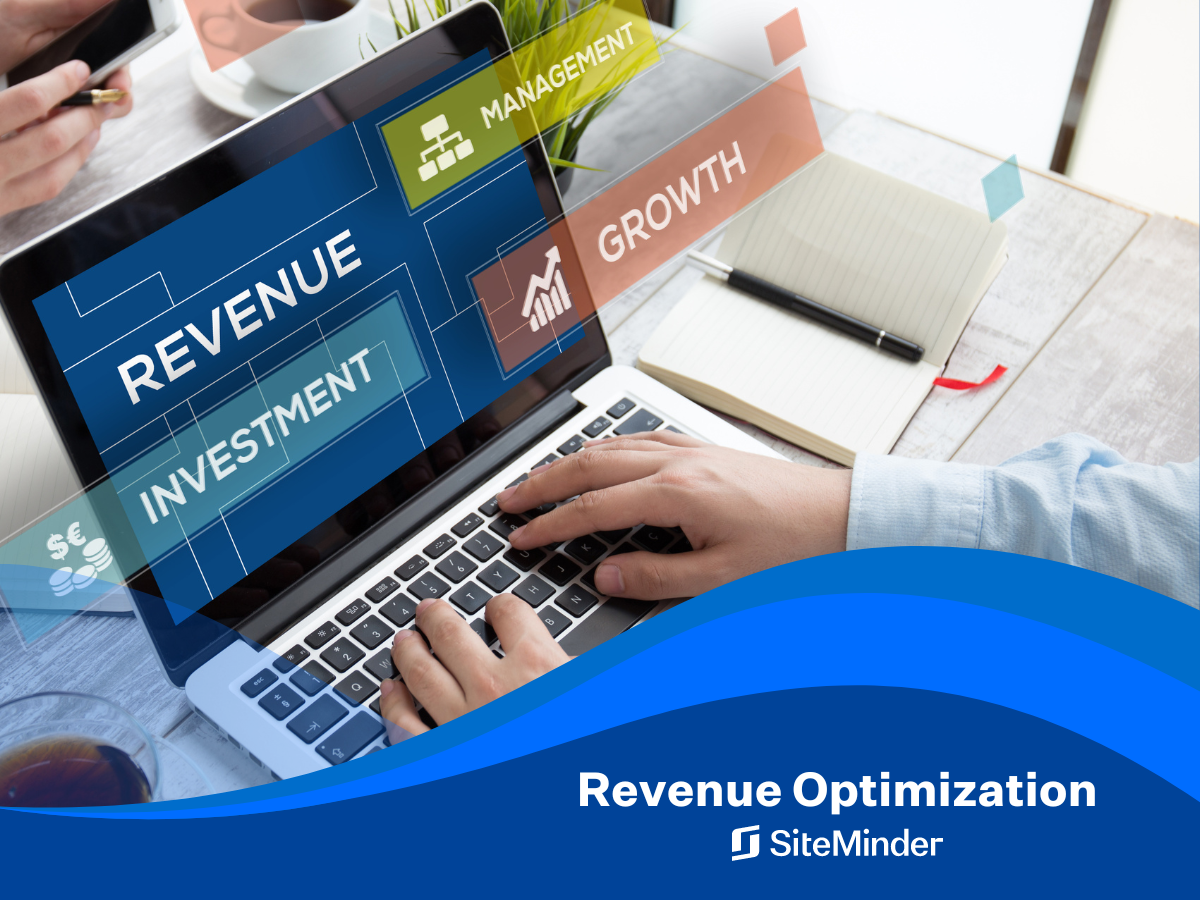What is revenue optimization?
Revenue optimization in hotels is a comprehensive strategy that accounts for all revenue streams and uses data to enhance the overall revenue performance of the business. It’s a holistic process that hotels can use to effectively manage pricing, inventory, distribution, customer demand, and more to promote revenue growth.
Revenue optimization recognizes and responds to opportunities to not only sell more, but sell more profitably too by using data, analytics, reports to make strategic decisions. Included in this will be key metrics, forecasting models, and trending insights.
Revenue optimization vs revenue management
In terms of definition and practice, there is a difference between revenue optimization and revenue management.
While revenue management is more focused on a hotel’s pricing and availability to maximize revenue, revenue optimization takes a broader approach to include a full range of revenue sources that includes food and beverage, spa services, events, classes, and other ancillary revenues.
Revenue management can be viewed as focusing on short-term tactics such as dynamic pricing and optimized inventory management to maximize room revenue, with revenue optimization taking a longer-term and more comprehensive approach.
In this blog, we’ll give you a full overview of revenue optimization and some ideas on how you can improve it at your hotel.
Table of contents
Why is hotel revenue optimization important?
Hotel revenue optimization is crucial for a hotel if it wants to sustain long-term success. Because hotel revenue optimization prioritizes holistic revenue management with long-term goals, using smart data and analytics, it can be incredibly effective in helping you to achieve profitability.
Hotel revenue optimization ensures that a property or brand is maximizing its profits from all available resources and opportunities. In addition to this, it can also help identify ways to create more efficient processes and improve the guest experience.
By prioritizing revenue optimization, your hotel will be in a stronger position to take advantage of data, trends, and market insights.
Optimized revenue, more profit What if you could boost your hotel's revenue and profit while also reducing your workload? Our smart hotel platform helps you do exactly that.
Benefits of pricing and revenue optimization
One of the major benefits of pricing and revenue optimization is that it is based on accurate, up-to-date, data. This is thanks to the advanced technology solutions that exist today such as revenue management systems, central reservation systems, real-time business intelligence tools, channel managers, and more.
There’s a full range of advantages for hotels and hospitality businesses. Here are some of the key benefits:
- Increased profitability: By setting the right room rates and managing inventory effectively, hotels can maximize their revenue without necessarily sacrificing occupancy rates.
- Improved forecasting: Revenue optimization involves analyzing data on past booking trends, competitor pricing, and market conditions. This allows hotels to forecast future demand and adjust their pricing strategies accordingly.
- Competitive advantage: In a dynamic industry like travel, being able to adapt pricing quickly can give hotels a significant edge over competitors.
- Better resource allocation: Revenue management helps hotels predict staffing needs based on anticipated occupancy levels. This ensures they have enough staff on hand during peak periods and avoids unnecessary costs during slower times.
- Data-driven decision making: Revenue optimization relies on data analysis to inform pricing and distribution strategies. This takes the guesswork out of decision-making and allows hotels to make choices based on concrete information.
- Guest segmentation: Revenue optimization tools can help hotels identify different guest segments (e.g., business travelers, families) and tailor their pricing and promotions accordingly.
- Frees up staff time: By automating many aspects of revenue optimization, hotels can free up staff time to focus on other important areas, such as guest service and marketing.

Developing revenue optimization strategies at your hotel
Before you start brainstorming ideas and tactics for revenue optimization, you have to know exactly what you want to impact and how to approach it.
The great thing about revenue optimization strategies is that they can be used across every facet of your hotel which generates revenue. This can be divided into three categories:
1. Primary revenue streams
- Room reservations
- Online Travel Agencies
- Global Distribution System (GDS)
- Corporate/Group Booking’
- Channel Management
2. Secondary revenue streams
- Food and Beverage
- Events and meetings spaces
- Spa and wellness services
- Parking and transportation
- Retail and gift shops
- Recreational activities
3. Upselling
- Room upgrades
- Packages and promotions
- Loyalty programs
- In-Room amenities
- Tours and experiences
In terms of what you need to effectively move the needle in these areas, there are also three major things you can invest in to get the ball rolling:
- Marketing and operational automation
- Sales efficiency
- Proper data collection
Using the right technology, such as a platform like SiteMinder, can make it much easier to get your ducks in a row and understand what strategic decisions will be the right ones for you.
10 revenue optimization ideas for your hotel
When it comes to putting ideas into action and creating strategies, there’s dozens that might prove effective for your particular business. Here’s 10 to get you started:
- Use dynamic pricing: Dynamic pricing involves adjusting room rates based on real-time demand. During peak seasons or high-demand events, you can raise prices to maximize revenue per room. Conversely, lower prices can attract bookings during slower periods.
- Perform demand forecasting: Hotel forecasting involves using data and analytics to predict future occupancy rates. This allows you to plan pricing strategies, staffing levels, and inventory management more effectively.
- Market segmentation: Target different guest segments with specific marketing campaigns and offerings. This caters to their unique needs and preferences, increasing the likelihood of conversions.
- Package deals: Create bundled packages that combine your room rate with other services like spa treatments, meals, or activities. This incentivizes guests to spend more and increase your overall revenue.
- Upselling and cross-selling: Upselling encourages guests to upgrade their room or add amenities like breakfast or parking. Cross-selling involves suggesting additional services that complement their stay, such as airport transfers or restaurant reservations.
- Length of stay restrictions: Implement minimum or maximum stay requirements to optimize occupancy during peak and off-peak periods. For example, you might require a 3-night minimum stay during winter when you’re less likely to get a large volume of bookings if you’re normally a summer destination.
- Channel management: Utilize a channel manager to streamline your distribution process across various online booking channels. This ensures rate consistency and prevents overbooking.
- Mobile optimization: Ensure your hotel website and booking engine are mobile-friendly. A significant portion of travelers use smartphones to research and book hotels, so a seamless mobile experience is crucial.
- Guest reviews and reputation management: Actively solicit guest reviews and address any negative feedback promptly. Positive online reviews significantly influence booking decisions.
- Referral Programs: Reward loyal guests and encourage them to recommend your hotel to others through referral programs. This is a cost-effective way to attract new customers.
Taking advantage of hotel revenue optimization software and solutions
Just like there are a huge number of strategies you can adopt to optimize revenue at your hotel, there’s a long list of hotel revenue optimization solutions that will make your job easier.
Understanding the best tools to use and implementing the ones that suit your hotel’s unique needs will give you a headstart towards profitability.
Here’s a few to take note of:
- Channel managers: Channel managers make inventory management and distribution simple, while also providing key performance reports.
- Revenue management systems (RMS): RMS’ provide sophisticated, data-led, revenue management analytics and recommendations.
- Booking engines: Booking engines enable a direct relationship with guests and turn your website into a revenue generator.
- Customer relationship management systems (CMS): Specifically manage interactions and communications with guests and potential customers.
- Global distribution systems (GDS): A GDS will give you the best access to thousands of travel agents and wholesalers to help diversify your reach and potential revenue.
- Business intelligence tools: Business intelligence tools will provide accurate, real-time, market data so you can keep a keen eye on your own price as well as that of your closest competitors.
- Upsell and other guest-focused apps: Hotel apps can streamline upselling, communication, check-in, room service, and more to ensure guests are happy and also aware of their value-added purchase options.

